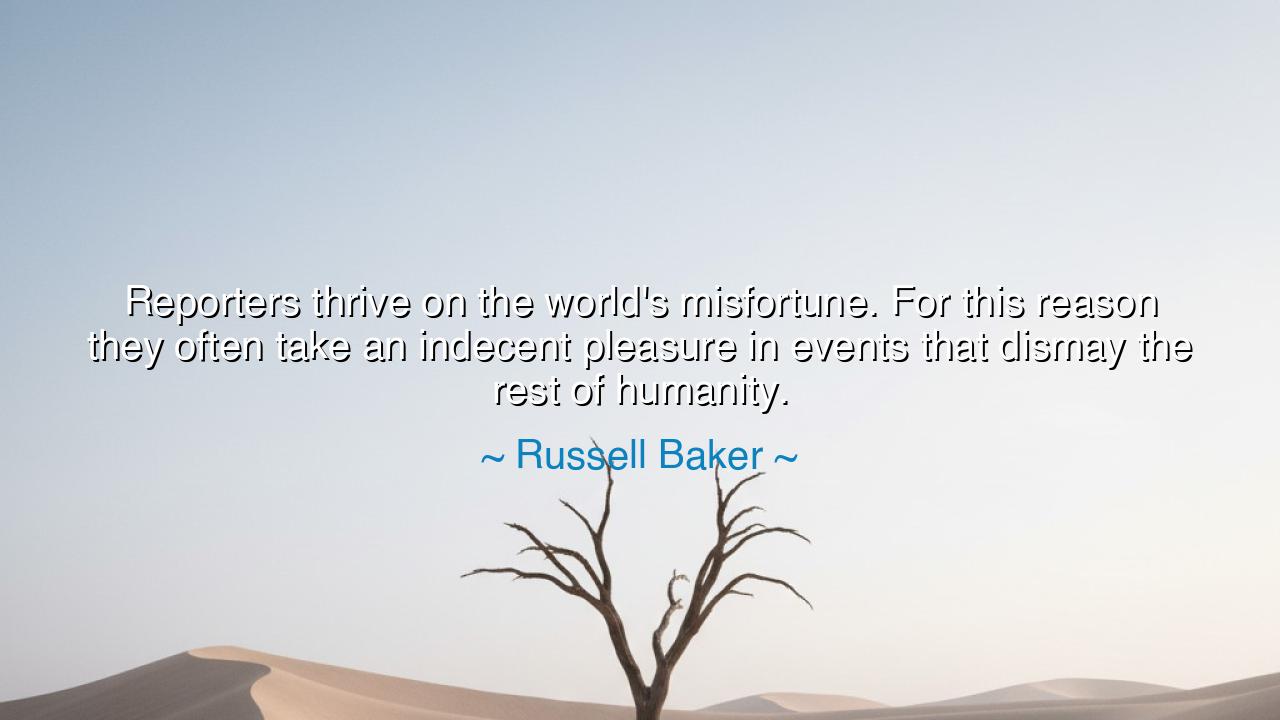
Reporters thrive on the world's misfortune. For this reason they
Reporters thrive on the world's misfortune. For this reason they often take an indecent pleasure in events that dismay the rest of humanity.






The words of Russell Baker, spoken with the sharpness of one who knew both the pen and the world, reveal a troubling paradox: “Reporters thrive on the world’s misfortune. For this reason they often take an indecent pleasure in events that dismay the rest of humanity.” In these lines, he unmasks the strange bond between journalism and tragedy—that calamity, which breaks the hearts of most, becomes the fuel that sustains the work of those who tell the world’s stories. For in chaos lies news, and in suffering lies the lifeblood of headlines.
The ancients knew this dilemma well. In the streets of Rome, criers shouted news of wars, assassinations, and disasters with voices full of urgency, while the citizens gathered with both dread and curiosity. Tragedy, it seemed, was the story that always drew the largest crowd. Even the poet Homer, in recounting the fall of Troy, thrived on recounting ruin, though his song was born from sorrow. Baker’s words remind us that what dismays humanity often feeds its hunger to know.
Consider the sinking of the Titanic in 1912. For families, it was grief beyond measure; for survivors, it was trauma without end. Yet for reporters, it was a story unmatched, filling columns and selling millions of papers across the globe. ors rushed to outpace one another, delighting in the details that horrified the grieving. The same pattern echoes in every age: catastrophe becomes commodity, and those who suffer are turned into ink and profit.
Baker’s saying is not mere condemnation, but a reflection on human nature. Reporters mirror the appetites of the people, who crave stories of disaster as moths crave flame. This “indecent pleasure” is less a flaw of journalism than a shadow upon the soul of society itself. For if tragedy did not draw readers, editors would not so eagerly print it. Thus his words are a call to honesty—that we recognize our own complicity in feasting upon sorrow.
Let the generations remember: to tell the truth of misfortune is necessary, for the world must know in order to act. But to delight in it, to profit from it, is a danger that corrodes compassion. Baker’s wisdom is a warning to both journalist and reader alike: that tragedy must not be consumed as spectacle, but borne as responsibility. For the world’s misfortunes are not stories alone—they are the lives of men and women, and they deserve reverence, not indecent pleasure.






Ttranthanhtung
Baker's observation about reporters is tough to digest. It makes me question the ethics of journalism, especially when the line between reporting and exploitation becomes blurred. Are reporters just doing their job, or is there an underlying satisfaction in being the bearer of bad news? It’s a complex issue—while the media plays an important role in keeping people informed, can it sometimes go too far in capitalizing on suffering?
VDVu Dang
Russell Baker seems to be criticizing the way media thrives on tragedy and disaster. It’s unsettling to think that reporters may feel pleasure from events that cause harm or distress to others. Should the media be responsible for promoting positivity and hope, rather than sensationalizing misfortune? What impact does this have on public perception and the emotional well-being of the audience? The role of the press might need some reevaluation in this regard.
HUHoang Uyen
This quote brings up an interesting question about the role of the media. While it's undeniable that negative events often dominate the news cycle, does that mean journalists take pleasure in reporting on them? Or is it more about meeting the audience's demand for stories that invoke strong emotions? It’s worth considering whether there's a balance to be found between responsible reporting and sensationalism in the media industry.
ACNguyen Anh Chi
Russell Baker's quote seems to shed light on an uncomfortable truth about journalism. It's disheartening to think that reporters might sometimes derive satisfaction from the misfortunes of others. Could this be the nature of news—where tragedy and conflict make the best stories? But is it ethical for the media to thrive on suffering, or should they be more responsible in how they portray the pain and misfortune of the world?